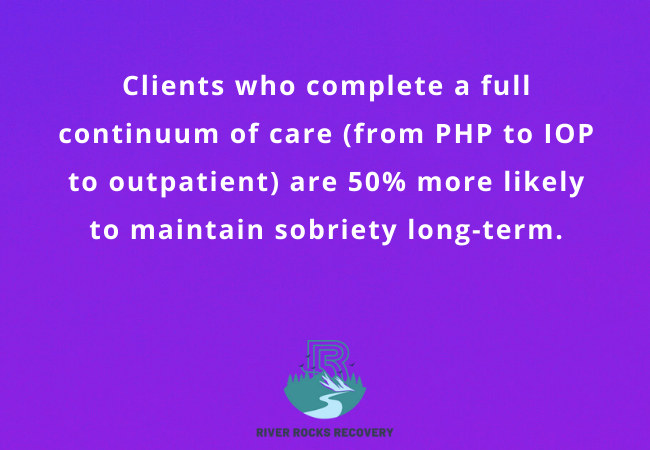Making the decision to seek help for drug addiction is one of the most courageous steps a person can take—but choosing the right drug rehab center can feel overwhelming. With so many options, levels of care, and treatment philosophies, it’s crucial to find a program that not only fits your needs but also supports your long-term recovery goals.
At River Rocks Recovery, we understand what’s at stake. That’s why we’ve created this comprehensive guide to help individuals and families in Middletown, Ohio and beyond navigate the process of selecting a rehab program that offers compassion, structure, evidence-based care, and a clear path forward.
Why Choosing the Right Rehab Matters
The rehab center you choose will shape your recovery experience—sometimes for life. A poorly matched program can result in:
- Early dropout from treatment
- Increased risk of relapse
- Inadequate mental health support
- Lack of long-term planning or community follow-up
In contrast, the right treatment center provides personalized care, clear structure, ongoing support, and the tools needed to rebuild your life free from addiction.
1. Look for Accreditation and Clinical Licensing
Start by verifying that the facility is properly licensed and accredited. This ensures that the rehab center meets national standards for safety, ethics, and treatment effectiveness.
At River Rocks Recovery:
- We meet all state and national licensing requirements.
- Our clinicians are licensed in addiction counseling, mental health, and psychiatry.
- We follow best practices as outlined by the Substance Abuse and Mental Health Services Administration (SAMHSA).
Accreditation provides peace of mind that the program follows evidence-based protocols and that you’re in safe, qualified hands.
2. Verify Their Levels of Care and Flexibility
Everyone’s recovery journey is different. That’s why a quality rehab center should offer multiple levels of care that meet you where you are—and grow with you as your recovery progresses.
River Rocks Recovery offers a full continuum of care:
- Partial Hospitalization Program in Middletown, Ohio (PHP): Full-day, highly structured therapy without overnight stays
- Intensive Outpatient Program in Middletown, Ohio (IOP): Therapy 3–5 days/week with increasing flexibility for work and life
- Outpatient Treatment Program in Middletown, Ohio: Long-term, low-intensity support for relapse prevention and life integration
Whether you need high-support structure or flexible care while balancing life commitments, we provide customized care plans for every stage of recovery.
3. Prioritize Individualized Treatment Plans
Addiction is deeply personal. No two people use for the same reason, and no two people heal the same way. That’s why cookie-cutter treatment plans don’t work.
Ask the center:
- Will I receive a personalized treatment plan?
- How often is my plan reviewed and adjusted?
- Are therapy sessions customized to my needs?
At River Rocks Recovery:
- Every client receives a personalized care plan created after a thorough clinical assessment.
- Plans include individualized therapy, medical needs, life skills development, and trauma-informed care.
- Your plan evolves as you grow, heal, and strengthen in your sobriety.
4. Ensure Dual Diagnosis Capabilities
Many people struggling with addiction also experience mental health conditions like:
- Depression
- Anxiety
- PTSD
- Bipolar disorder
- Trauma history
If these conditions go unaddressed, they can fuel relapse and complicate recovery.
Dual diagnosis is essential for:
- Opiate addiction
- Benzodiazepine dependency
- Alcohol or stimulant use tied to emotional distress
River Rocks Recovery is a dual diagnosis treatment center:
We treat both the mental and physical aspects of addiction, using:
- Psychiatric evaluations and medication management
- Trauma-informed therapy (CBT, DBT, EMDR)
- Mindfulness and emotional regulation tools
5. Explore the Rehab’s Therapy Options
Therapy is the heart of addiction treatment. Look for a facility that offers a range of evidence-based therapeutic modalities, so your care is dynamic and effective.
At River Rocks Recovery, our therapy options include:
- Cognitive Behavioral Therapy (CBT)
- Dialectical Behavior Therapy (DBT)
- Motivational Interviewing (MI)
- Trauma-Focused Cognitive Therapy
- Family Therapy
- Group therapy for relapse prevention, emotional regulation, communication, and more
These therapies are used throughout our Drug Rehab Treatment in Middletown, Ohio, ensuring that clients build both insight and skills to support long-term healing.
6. Review Staff Qualifications and Support Services
An exceptional rehab center will have a multidisciplinary team made up of:
- Licensed therapists
- Medical professionals
- Psychiatrists or nurse practitioners
- Case managers
- Recovery coaches
They should also offer support services like:
- Job-readiness training
- Legal and housing referrals
- Alumni and peer support
River Rocks Recovery’s care team includes:
- Certified addiction counselors
- Licensed clinical social workers
- Psychiatric nurse practitioners
- Trauma specialists
- Peer mentors with lived recovery experience
7. Ask About Relapse Prevention Planning
Addiction is a chronic condition, and relapse prevention is a vital part of effective rehab. A quality program should prepare you not just to get sober—but to stay sober.
At River Rocks Recovery, our relapse prevention program includes:
- Individual relapse response planning
- Trigger identification and management tools
- Real-world coping skills
- Peer accountability groups
- Access to ongoing outpatient care and alumni support
We don’t just discharge clients—we set them up for lifelong recovery.
8. Consider the Environment and Atmosphere
You should feel safe, supported, and welcomed in your rehab environment. The setting should promote healing, not feel institutional or cold.
River Rocks Recovery offers:
- A welcoming, modern facility
- A peaceful and private setting in Middletown, Ohio
- Comfortable therapy rooms and recovery spaces
- A supportive community culture focused on empowerment and progress
9. Look for Post-Treatment Support and Alumni Services
What happens after rehab can make or break your long-term recovery. Ensure the rehab center you choose offers a robust aftercare plan, including outpatient therapy, support groups, and alumni engagement.
Our alumni services include:
- Weekly peer support meetings
- Monthly community events
- Access to therapy sessions and recovery coaching
- Relapse support and early intervention options
You leave our care—but you’re never alone.
10. Evaluate Accessibility, Location, and Cost
Key questions to ask:
- Is the program close to home or in a preferred location?
- Does it accept your insurance?
- Are payment plans or scholarships available?
- Is telehealth support an option if needed?
At River Rocks Recovery:
- We’re centrally located in Middletown, Ohio, serving families across the region.
- We work with most major insurance providers.
- Our admissions team provides transparent guidance on payment and coverage.
- Telehealth services are available for aftercare and flexibility when needed.
Why Choose River Rocks Recovery in Middletown, Ohio?
We are more than just a treatment center—we are a partner in lifelong recovery. With a full continuum of care, trauma-informed therapy, dual diagnosis integration, and unmatched community support, River Rocks Recovery is built for clients who want to break free from addiction and start over—stronger.
We offer:
- A complete range of Addiction Treatment Programs in Middletown, Ohio
- Personalized plans through PHP, IOP, and outpatient care
- Specialized Opiate Rehab Treatment in Middletown, Ohio
- A highly skilled, compassionate clinical team
- Family-inclusive care and long-term support
Whether this is your first step or your next step, we’re ready to walk it with you.
Conclusion
Choosing the right drug rehab center is about more than checking boxes—it’s about finding a place where you feel seen, supported, and equipped for a better life.
At River Rocks Recovery, we combine evidence-based care, personalized support, and community-driven recovery to help every client heal—mind, body, and soul. Call us today at 888-905-6281 to schedule your confidential consultation. When you’re ready to reclaim your life from addiction, we’re ready to help you make the right choice—starting now.
FAQ on Choosing the Right Drug Rehab Center
Why is choosing the right drug rehab center so important?
Choosing the right center ensures you receive the level of care, clinical expertise, and support necessary for lasting recovery. The wrong fit may lead to relapse or early dropout.
What levels of care should a quality rehab center offer?
Look for a rehab that offers a continuum of care such as:
-
Partial Hospitalization Program (PHP)
-
Intensive Outpatient Program (IOP)
-
Outpatient Treatment
These levels allow for flexible, step-down recovery options.
What is dual diagnosis treatment and why does it matter?
Dual diagnosis treatment addresses both addiction and co-occurring mental health conditions like anxiety, depression, or PTSD. Treating both is critical to prevent relapse.
Should rehab programs offer individualized treatment plans?
Yes. Personalized plans tailored to your substance use history, mental health, lifestyle, and goals are key for effective and meaningful recovery.
What should I look for in therapy offerings?
Ensure the center provides evidence-based therapies like:
-
Cognitive Behavioral Therapy (CBT)
-
Dialectical Behavior Therapy (DBT)
-
Trauma-informed therapy (EMDR, TF-CBT)
-
Group and family counseling
How can I tell if the rehab staff is qualified?
Look for licensed addiction counselors, mental health professionals, and medical staff. Ask about credentials and whether the program includes psychiatrists or medication management.
Does location matter when choosing a rehab center?
Yes. Proximity can help with accessibility and family involvement. For those in Middletown, Ohio, River Rocks Recovery offers a convenient and serene setting close to home.
Does River Rocks Recovery provide aftercare support?
Absolutely. We offer ongoing outpatient care, alumni programs, peer mentorship, and relapse prevention tools to ensure long-term success after treatment ends.





























